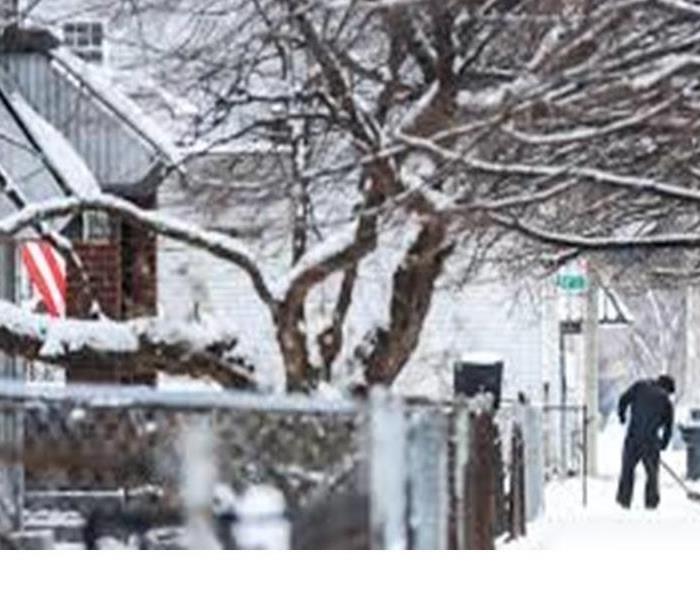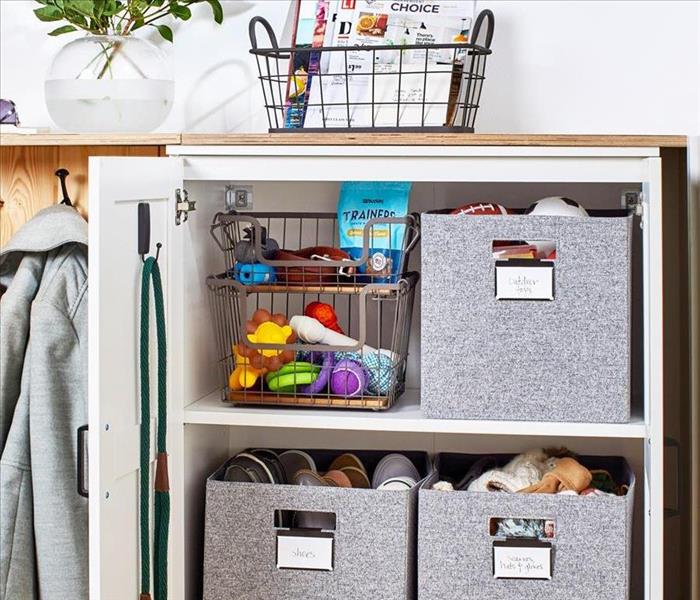Winter Precations
12/30/2021 (Permalink)
 Winter Weather
Winter Weather
BEFORE THE COLD SETS IN
- Know where your main water shut-off valve is located.
- Turn off your irrigation system.
- Eliminate sources of cold air near water pipes by fixing windows or insulating walls.
Protect exposed pipes by wrapping them with insulation, fabric or newspaper.
It’s all about prevention. Frozen pipes can leave you without water in the worst of weather. And they cost a lot to repair. But with a few simple steps, you can easily preserve both your budget and your peace of mind.
BEFORE THE COLD SETS IN
- Know where your main water shut-off valve is located.
- Turn off your irrigation system.
- Eliminate sources of cold air near water pipes by fixing windows or insulating walls.
- Protect exposed pipes by wrapping them with insulation, fabric or newspaper.
WHEN TEMPERATURES STAY BELOW FREEZING
- Let the snow cover your water meter. Snow acts as insulation, so don’t disturb it.
- Allow a small trickle of water to run overnight to keep pipes from freezing.
- Open cabinet doors to let warm air in your home reach the pipes.
IF YOUR PIPES FREEZE
- Shut off the water immediately.
- Apply heat to the frozen pipe by warming the air around it. Avoid kerosene heaters or open flames.
- Turn the water back on slowly once pipes have thawed, and check for cracks and leaks.
Home Organization
10/12/2021 (Permalink)
 Decluttering Strategies
Decluttering Strategies
Hone Your Decluttering Strategy
Organizing your home bit by bit means you can avoid the overwhelm that comes with an hours-long decluttering marathon. To get started, choose a room and select one simple task to complete. Set a timer for 15 minutes and get as much done as you can within that time. If you don't finish the project, start the timer over or come back to it later.
Chip Away at Clutter
Identify your biggest clutter issue, whether that's magazines and mail, kids' gear, or another type of item. Spend a few minutes every day, or every few days, tackling this project. As you sort through the accumulated items, determine what can be tossed, recycled, donated, or stored elsewhere. Then sort everything that's left into categories and bring in organizers to neatly contain the items.
Categorize Pantry Items
Target a category of pantry items that tends to remain jumbled and difficult to access. Focus on a single pantry staple, such as baking supplies, breakfast foods, or snacks, instead of trying to reorganize the entire system. Use bins and baskets to organize similar items, and label your containers so you know what goes where when you're unloading your next round of groceries.
Separate Bathroom Supplies
Extra bottles of shampoo and other spare toiletries can easily get lost under your bathroom sink. To avoid purchasing more of what you already have, try professional organizer Laura Leist's "shop from home strategy." Store your excess products elsewhere, such as in a linen closet or in a basket on a shelf, and check your inventory before you go shopping.
Store First Aid Supplies
Store first aid supplies in a caddy or tray to keep your closet tidy and make it easy to carry the whole kit anywhere in the house. A utensil tray works well for corralling bandages, ointments, and first aid supplies in different compartments. Clip on file tabs to identify what goes where.
Keeping Your Pets Safe in Winter
1/28/2021 (Permalink)
A Guide for Keeping Your Pets Safe in Winter
Dogs and, yes, even cats, can have a blast in the winter, exploring and frolicking in freshly fallen snow. But dogs (well, most dogs anyway) particularly love a snowy terrain. They like to bound and dig in their giant, new, snowy playground and never seem to want to go inside no matter how ready their humans are to leave the cold and wet outdoors behind.
However, frozen precipitation and colder temperatures can also be dangerous for dogs if their owners don't take proper precautions. If you're a new pet parent, or simply unsure of the best way to care for your pet during the winter months, it's important to get acquainted with the do's and don'ts of keeping your pet safe and healthy out there.
Keep them bundled up
Even if the temperature is above freezing, pets' extremities, just like our own, are extremely susceptible to wind chill. They can get hypothermia and frostbite on their exposed paws, noses and ears. While dogs and cats don't typically wear hats for long, you can help protect them from the cold by putting them in insulated sweaters and jackets, and covering their feet with waterproof paw booties. Those booties will also help keep their paw pads from cracking from the de-icing salt on roads and walkways.
Wipe them down as soon as they come inside
As a form of precipitation, snow can leave pets cold and very wet at the end of a snowy play session, and if they remain like that for a while, they could get a cold or hypothermia (your furniture will also take a beating). In order to avoid all that, make sure to towel them off as soon as they come inside. You can keep a designated pet towel by the door so you never forget this important step.
NEVER leave pets outside overnight or for an extended period of time
According to the Humane Society, you should never leave pets outside for long periods of time when it gets cold. In fact, leaving a pet outside alone in temperatures below freezing for more than 30 minutes is considered neglect, which is a punishable crime. Even if you have a typically outdoor cat, they should be able to get inside somewhere warm whenever they need to.
If your pet has to spend a significant amount time outdoors, they should have access to a dry, insulated shelter that's large enough for them to move around in and maintains their body heat.
Eating and drinking guidelines
Dogs especially expend more energy when they're running outside in the cold. You can help them make up for that by feeding them a bit more food so they can replace the energy/calories they lost playing. You may also want to consider exchanging your metal food and water bowls for plastic ones if you keep them outside as a warm dog tongue could easily get stuck to them.
Keep pets from eating rock salt
Pets suffering from salt poisoning, unfortunately, becomes much more common in the winter months, because rock salt is regularly used to de-ice the roadways and walkways they walk on. If they ingest it, either while on a walk or by licking it off their paws, it can be fatal. The best way to prevent salt poisoning is to keep an eye on your pet and if you notice they've eaten salt, wash their mouth out and call the pet poison hotline. If you're not sure whether or not your pet has ingested salt, here are some warning signs of salt poisoning to watch out for: vomiting, diarrhea, lethargy, not eating, excessive thirst and/or urination, incoordination, tremors and seizures.
Take them for their annual vet visit
Right before winter hits is the perfect time to take your pets in to see the vet, because you'll learn if they have any new conditions that might make winter a bit tougher on them. For example, chronic illnesses like diabetes, heart disease and kidney disease can lower a pet's cold-temperature tolerance. And, of course, new or worsening arthritis can make for stiffer joints during cold snaps.
Shorten walking times
It may be tempting to let your pet play in the snow for hours on end, but like us, they have cold weather limits, they just aren't as aware of them. So if it's below freezing, you should limit playtime to under 30 minutes, especially if you have an older pet or one that's compromised in any way.
Don't leave your pet in a cold car
Just like how a car left in the hot sun can heat up fast and basically become an oven for any living thing inside it, cars left out in the winter become like refrigerators. So the general rule of thumb is don't take your pets on errands if you know you're going to be leaving them in a car for longer than five minutes, especially if it's balmy or freezing outside.
Pet-proof the inside of your house
Since your pets should be spending more time indoors in the winter, it's a good idea to secure all of your heating devices that could be susceptible to a bounding and/or large creature. For example, if you've set up a portable heater in your living room, make sure you have a barrier around it so that your pet doesn't knock into it or knock it over and potentially start a fire. And if you have radiators that can get hot, you might want to put a barrier around them as well so that pets don't burn themselves.
Freezing Pipes
12/15/2020 (Permalink)
Temperatures are dropping. Here are a few pointers to help protect your pipes.
- check sprinkler systems. make sure they are turned off and drained.
- Locate your main water shut-off and shut it off for the winter.
- Remove exterior hoses.
- Protect any pipes exposed to the cold. wrap them with insulation.
When Temperatures stay below freezing:
- Open cabinet doors to pipes that are on exterior walls to let in warmer air.
- Keep water running trough the pipes, even a small trickle.
If your pipes do freeze:
- Shut off the water immediately
- Thaw pipes with warm air.
- One pipes are thawed be careful and slowly turn water back on checking joints for any cracks or leaks.
Please take the time to protect your pipes this winter.
Weather Warnings
9/12/2019 (Permalink)
Be sure to watch the weather today. We have severe weather headed our way! Use these links to stay informed:
forcast.weather.gov
Weather.com
Before heavy rains come you might want to clear all gutters and drains of any debris.
Meet Barry Throckmorton our Production Tech Crew Chief
6/26/2019 (Permalink)
Barry has been with the SERVPRO Team in Production for 5 years. He is often the first to show up to any job and the last to leave! He is ECTP, OSHA 10 & Construction, water, and confined space certified. He also has training in water, fire, carpet & upholstery, contents management and crew training. His extensive training shows in his work too as each job that he completes is done fast and professionally. His work ethic and drive are both impressive and we love having him around. Many of our customers rave about Barry and the service he does to their property. We hope that if you do end up needing our services, that you get to meet Barry and the rest of our crew. He leads the the whole team with positivity. We are very lucky to have an employee with such dedication! Thank you for all the time and effort you put into your job, Barry!
Check Out These Home Maintenance Tips To Do Before Summer Hits
6/11/2019 (Permalink)
Another Nickel posted this recent article that can be very helpful for those trying to save some money this summer around the house! https://anothernickel.com/vital-home-maintenance/
It has tips from insulting your attic area more properly, to turning down your water heater. Try to make your home work for you by knowing what energy is being wasted and what is being used. Here are some other key ideas the article has for saving money:
- "Childproof" Your Outlets Even If You Don't Have Kids"
- Use WD-40 For EVERYTHING!
- Change ALL Your Air Filters
- Clean Your Refrigerator Coils!
- Seal Your Sidewalk Cracks
Here at SERVPRO, we are all about improving your home and your life! Make some simple adjustments to your house to improve your life!
Office Manager Amber Flinders Is Expanding Her SERVPRO Knowledge
6/4/2019 (Permalink)
 Amber Flinders
Amber Flinders
Meet Amber Flinders! She has been our office manager at SERVPRO of St. Joseph for 14 years. She is an asset to our business while overseeing all office operations and handles all of the invoicing and collections. Her responsibilities in our office are endless, but she always has a smile on her face and a positive attitude! She is also certified in crew training, water, fire, carpet & upholstery and contents management. Right now she is working extra hard completing advanced Xactimate Training to be even more prepared and skilled for her job with many hats. This training is showing her new skills to take on as well as refreshing her on current knowledge. We appreciate all you do for this company Amber, thank you so much!






 24/7 Emergency Service
24/7 Emergency Service

